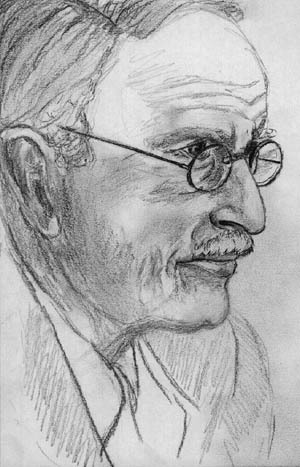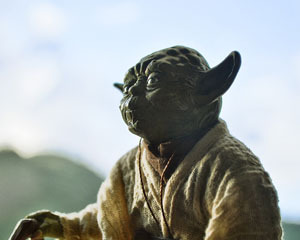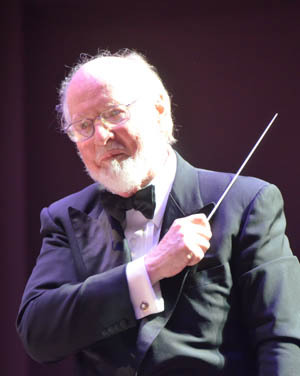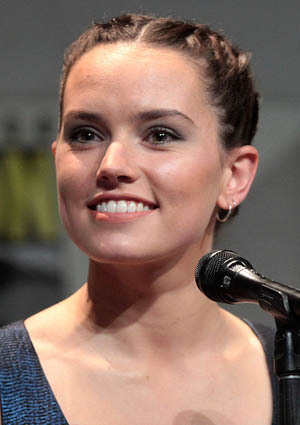Like millions of other people I couldn't wait for the premiere of the new Star Wars: The Force Awakens last December. I attended a few days after the crowds had dispersed, and sat there in rapt expectation, clutching my large bag of M&Ms. Then, there it was--the film I had so eagerly anticipated--and just as suddenly it was over and I was left somewhere strange, as it made a quite deep impression on me. I have spent the last several weeks trying to make some sense of my reaction. To begin with, I felt as if time had collapsed, not just that of Harrison Ford and Carrie Fisher who reprise their earlier roles, but my own time since seeing the original. It had suddenly narrowed into a thin point of light and I was having trouble making sense of its direction. Then there was the overwhelming emotional impact. Something very profound within me had been set alight and I just couldn't find the answers to this internal catalyst that had released this reflective energy within me. So I did what I often do in such baffling situations, I sat down and wrote about it.
Standing in the cold and rain in a line trying to get into a movie house is not my idea of a great night out. And yet I did it twice without success and it was only on my third attempt that I squeezed in. It was 1977 and the movie was the first ever Star Wars, about which I knew very little. There was no Internet so no previews that you could string together to make sense of the whole story. Instead, there was just a series of newspaper ads, and feature articles and I remember something on the BBC 9 o'clock TV news about the film's U.K. premiere at the Odeon Leicester Square in London. The film was strangely called Episode IV, which made me wonder where I had been for the previous three episodes. Despite having little idea what to expect, I nonetheless had a feeling that this could be something really good, which is why I was prepared to stand in the rain to secure a ticket.
The impression the movie, its story, and the thrilling new world it created, made on me was indelible. I had never seen a film that allowed you to be so totally in the moment with its story and characters! Fast paced, intelligent, accessible and, above all, mythical, this was great storytelling! The introduction of the light saber, the famous scene with the droid R2D2 showing the hologram of Princess Leia telling her story and ending with "Help me, Obi-Wan Kenobi, you're my only hope", the "live" board game, and the long journey that all the characters would be taking, this was the stuff of genius. It was a saga that left me full of hope, energy and a curious form of self-recognition.
The person of Luke, the young man who was our hero, came straight out of mythology. His journey was one of overcoming fear and discovering himself, of becoming the Jedi Knight whose sect once ruled the galaxy in peace and harmony. He was the original Star Wars' Aeneas and Hector and Achilles and Tyrion, Tywin Lannister, and Captain Kirk and Harry Potter and Gandalf. We are all hard wired to respond to heroic story-telling be it in the Bible, Shakespeare, Homer or Game of Thrones. It touches the core part of what it means to be human. It helps us explain our lives, to set goals, and establish values, and it sometimes provides a means to know more of who you are through self-realisation.
 The great Swiss psychiatrist Carl Jung was one of the major pioneers of the C20 delving into our understanding of the sub-conscious and the collective unconscious with a recurrent theme of archetypes and the importance of myths to our psyche. He was very interested in eastern philosophy such as the Buddhist quest for spiritual perfection through solitude (Hinayana) . He saw myths as containing messages for the individual and maintained that our dreams are the wellspring for these stories, which awaken at night. He recognized the emotional attraction of these narratives and our unconscious or even conscious sense of the truths that they hold.
The great Swiss psychiatrist Carl Jung was one of the major pioneers of the C20 delving into our understanding of the sub-conscious and the collective unconscious with a recurrent theme of archetypes and the importance of myths to our psyche. He was very interested in eastern philosophy such as the Buddhist quest for spiritual perfection through solitude (Hinayana) . He saw myths as containing messages for the individual and maintained that our dreams are the wellspring for these stories, which awaken at night. He recognized the emotional attraction of these narratives and our unconscious or even conscious sense of the truths that they hold.
"Myths are first and foremost psychic phenomena that reveal the nature of the soul."--Carl Jung, The Archetypes and the Collective Unconscious
 We can see this as the corner stone of the relationship between Luke and his Jedi teacher, Yoda. George Lucas would have known all this when he was writing the original Star Wars and he gave us a mythological tale that touches us all.
We can see this as the corner stone of the relationship between Luke and his Jedi teacher, Yoda. George Lucas would have known all this when he was writing the original Star Wars and he gave us a mythological tale that touches us all.
Lucas' genius extended beyond the conception of the story to engaging a composer for the film who could underscore the power of the storytelling and myth-making. Back in 1977, he chose John Williams (in photo below right) who already had a quite large portfolio of major film scores to his credit such as Valley of the Dolls, The Towering Inferno, and Jaws. It was with Jaws (1976) that Williams created something uniquely individual--that famous shark theme and the technique of associating characters with their own recognizable musical themes. He brought that technique to new heights with the first Star Wars. We can still recognize the music of Princess Leia, of Luke, The Force, the Empire, Obi-Wan, even the Death Star. And those "leitmotifs" give the myth a new level of meaning and substance that certainly Homer and Virgil could never have dreamed of. Through the music, the conscious and sub-conscious mind blend with the story and the characters to create a music drama that can touch the soul. I maintain that this is the fundamental attraction of the whole phenomena called Star Wars.
 There is one small episode that illustrates this, again from the first movie. It's the death of Obi-Wan, Luke's mentor and idealized hero. He falls at the hand of the arch villain Darth Vader in a duel with light sabers. Obi-Wan kisses the sword and the inevitable happens. Watching from a distance, Luke is powerless to help, but is galvanized by the saber blow. The music that accompanies this inflection point in the story is some of Williams' richest and most magical. Although only briefly, the full orchestra cries out at this moment of tragedy with Leia's theme in its most dissonant form. It's a moment of the greatest emotion.
There is one small episode that illustrates this, again from the first movie. It's the death of Obi-Wan, Luke's mentor and idealized hero. He falls at the hand of the arch villain Darth Vader in a duel with light sabers. Obi-Wan kisses the sword and the inevitable happens. Watching from a distance, Luke is powerless to help, but is galvanized by the saber blow. The music that accompanies this inflection point in the story is some of Williams' richest and most magical. Although only briefly, the full orchestra cries out at this moment of tragedy with Leia's theme in its most dissonant form. It's a moment of the greatest emotion.
 As directed by J.J. Abrams, The Force Awakens (2015) returns us very much to the magic of the first movie with tugs at our memory. We catch a glimpse of the "live" board game, we get to cheer at the sight of that old space wreck, the Millennium Falcon, and we smile at the misuse of "parsecs." But there is something brilliantly cyclical happening as well, with major story foundations put in place (albeit retroactively) that resonate with the original film. This creates huge myth development potential for the next two planned Episodes. For example, here is what I observed in the central "dream sequence." Our new girl-power heroine Rey (in photo right), played by the totally unknown British actress Daisy Ridley (much as Mark Hamill was totally unknown before the first Star Wars) finds and touches Luke's original light saber, which he lost together with his right hand in a fight with Vader. Now lots of questions over that! She touches it and is propelled into a nightmare vision of possible future actions and we hear, very briefly, the voice of Ewan McGregor as Obi-Wan. It's like a mirror image of the first movie and Luke's introduction to his light saber by Obi-Wan and it declares very clearly that this particular myth still has a journey to make and a great story to tell before it can finally rest in our imaginations.
As directed by J.J. Abrams, The Force Awakens (2015) returns us very much to the magic of the first movie with tugs at our memory. We catch a glimpse of the "live" board game, we get to cheer at the sight of that old space wreck, the Millennium Falcon, and we smile at the misuse of "parsecs." But there is something brilliantly cyclical happening as well, with major story foundations put in place (albeit retroactively) that resonate with the original film. This creates huge myth development potential for the next two planned Episodes. For example, here is what I observed in the central "dream sequence." Our new girl-power heroine Rey (in photo right), played by the totally unknown British actress Daisy Ridley (much as Mark Hamill was totally unknown before the first Star Wars) finds and touches Luke's original light saber, which he lost together with his right hand in a fight with Vader. Now lots of questions over that! She touches it and is propelled into a nightmare vision of possible future actions and we hear, very briefly, the voice of Ewan McGregor as Obi-Wan. It's like a mirror image of the first movie and Luke's introduction to his light saber by Obi-Wan and it declares very clearly that this particular myth still has a journey to make and a great story to tell before it can finally rest in our imaginations.
Then, there are the subtleties of the music for The Force Awakens, which for me make it so special. John Williams returns again here. He doesn't recap his early score, instead he keeps his ammo dry emotionally and musically, and only uses those oh-so-recognizable themes at just the right dramatic and psychological moments. So when the great hero Han Solo, with strong musical backing, addresses the newbie hero and heroine saying "Everything you have heard......it's all true," all I could do was roar with approval because that's how it felt.
And at the end of all this I still don't have the answer to my question about my reaction, much as I don't know the outcome of this particular myth. So I had best keeping watching because it seems to be rather important!